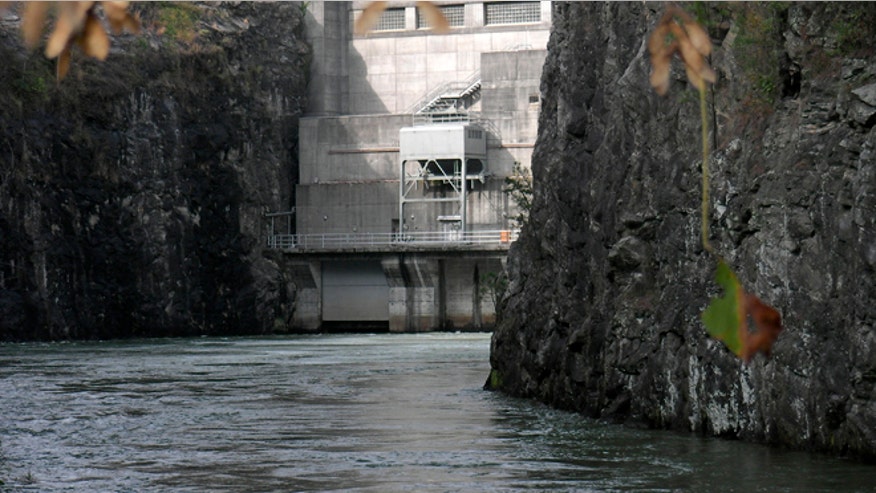http://www.foxnews.com/politics/2014/02/17/water-war-southern-states-battle-to-keep-faucets-flowing/ Water War: Southern states battle to keep faucets flowing

By
Barnini ChakrabortyPublished February 17, 2014FoxNews.com

Oct. 18, 2007: Buford Dam, at the south end of Georgia's Lake Lanier is pictured in this photo. In a January letter to Sens. Barbara Boxer and David Vitter, the chairman and ranking member of the Committee on Environmental & Public Works, Sen. Jeff Sessions, R-Ala., zeroes in on the U.S. Army Corps of Engineers, saying it has entered “but never enforces, water supply contracts with Atlanta-area interests and even allows Atlanta-area interests to withdraw water from Lake Lanier for just one-thousandth of a penny per gallon and to sell the same water to their respective customers for around 250 times that amount.”Reuters
The drought-parched states of Georgia, Alabama and Florida are back at it -- fighting for a slice of water rights in a decades-long water war that’s left all three thirsty for more.
The 24-year dispute is emblematic of an increasingly common economic problem facing cities and states across the country – the demand for water quickly outpacing the supply as spikes in population soak up resources.During the dispute, Alabama and Florida have argued metro Atlanta consumes more water than it should, leaving too little downstream for municipalities, farmers, business interests and endangered shellfish. They believe the amount of water legally available to the metro Atlanta area should be scaled back significantly.
Florida says Georgia’s water grab is cutting off the water flow the seafood industry in Apalachicola Bay needs to survive.
Alabama says Georgia’s increased water consumption is placing an unfair economic burden on its residents.
The water fight was taken to the courts, and in June 2011 Atlanta won a big legal victory after a panel of judges reversed a decision that would have severely restricted access to the city’s water supply for nearly 3 million people. Almost immediately, Alabama and Florida asked the 11
th U.S. Circuit Court of Appeals to reconsider the ruling over water rights in the basin formed by the Chattahoochee, Flint and Apalachicola rivers.
In 2011, the 11
th Circuit Court of Appeals also ordered the Army Corps of Engineers to work on a new water allocation plan for the region.
In October, Florida officials said their state needed immediate relief from the growing water consumption problem.
“Generations of Florida families have relied upon these waters for their livelihood, but now risk losing their way of life if Georgia’s actions are not stopped,” Florida Gov. Rick Scott told reporters after the state filed legal action last year.
Last week, attorneys for the state of Georgia asked the U.S. Supreme Court to stay out of the latest legal drama, saying Florida was trying to sue “the wrong party, in the wrong court, and at the wrong time,” according to court documents.
The tristate fight has moved from the courts to Congress as lawmakers in Alabama and Florida have looked for ways to challenge Georgia’s water consumption.
Sen. Jeff Sessions, R-Ala., argued in a January letter to Sens. Barbara Boxer and David Vitter, the chairman and ranking member of the Committee on Environmental & Public Works, that Atlanta-area water withdrawals are causing “substantial harm to the environment and downstream communities in Alabama and Florida.”
Sessions letter highlights key findings from hearings held last summer from water management officials from all three states and leaders from the U.S. Army Corps of Engineers before a congressional committee.
He says because there is less water to generate electricity at the hydroelectric dams, “more expensive energy -- perhaps produced by carbon fuels -- will have to replace it.”
He also says federal hydropower customers in his home state would pay lower rates for electricity if Atlanta-area interests paid appropriately for water "they actually withdraw.”
He also zeroes in on the U.S. Army Corps of Engineers, saying it has entered “but never enforces, water supply contracts with Atlanta-area interests and even allows Atlanta-area interests to withdraw water from Lake Lanier for just one-thousandth of a penny per gallon and to sell the same water to their respective customers for around 250 times that amount.”
Georgia’s water war isn’t limited to Florida and Alabama. The state has a storied history of not playing nice with its neighbors and is currently locked in another fight with Tennessee.
Last year, lawmakers in Atlanta tried to renew efforts to tap into Tennessee’s water supply contesting the state’s border with its northern neighbor.